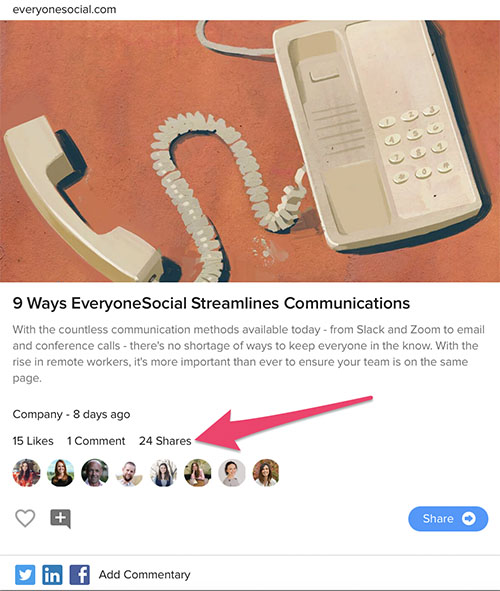Prioritizing brand management is one of the most important aspects of developing a successful business.
Your company’s brand must be seen as a leader in its industry for continued long-term brand growth, as well as to develop loyal customers.
In this post, I’ll explore:
- What Is Brand Management?
- The Importance of Brand Management
- Common Strategic Brand Management Steps
- How Employees Can Shape Your Company’s Brand
What is Brand Management?
Brand management refers to the design, overall placement, marketing, advertising and distribution of the product or services that help develop the complete brand personality.
It’s also the perception or perceived value your company brings to the market and its relationship with its audience and customers.
Brand management is also a vital piece of marketing. It utilizes various techniques and marketing copy to boost market share, company value, and, of course, a strong brand.
Yet, what brand management really comes down to is trust.
If your organization doesn’t develop brand consistency and deliver on promises of what your products and/or services do, you lose potential buyers — both their loyalty and their dollars.
Consumers generally believe they can trust a brand to deliver, but if your brand fails to meet consumers’ needs, trust is broken and the brand’s credibility can be irrevocably damaged.
The Importance of Brand Management
Without a positive brand reputation, consumers, buyers, prospects, and even employees may be skeptical or unsure of what your company does and represents.
No matter what industry you’re in or what your company provides, its brand image plays a huge role in growing the business.
You don’t need to spend tons of marketing dollars on branding. In fact, many top companies actually don’t spend much at all.
Instead, these organizations focus on a strategic brand management process that enhances their brands and ensures they’re highly visible in their markets.

Where Brand Management is Impactful
You might think branding and brand management strictly impacts marketing, but the brand needs to be embraced across your entire organization — not just the marketing department.
Here’s how brand management impacts your entire company:
- Marketing can communicate the value the products and services much easier.
- Sales can interact with prospects more clearly and get a pipeline of leads that better understand the value your company provides.
- Your prospects and current customers have a better understanding of what to expect from your business.
- You can create a team of loyal and enthusiastic customer and employee advocates.
- Recruiting top talent improves as your brand and culture naturally attract people.
Common Strategic Brand Management Steps
When it comes to your company’s image, it takes time to ensure a specific brand strategy is set up for success and long-term brand growth.
That’s where strategic brand management becomes necessary. Without it, your company brand becomes messy and inconsistent.
Here are four steps or principles of brand management that’ll help your company build a brand in the long-term.
- Brand Positioning – Clearly defining what the brand represents, what your company wants to achieve, and how it should be positioned with respect to competitors. This might be the hardest step as it determines which direction the entire brand should go; research into your industry and competitors will help shape your brand position.
- Brand Marketing – This is where your entire marketing team becomes important. Items included in this section are the overall marketing initiatives needed to get the brand messaging and company visible to the masses. Again, research and creativity are necessary to make sure your company sees results.
- Brand Measurement – Once you start marketing the brand, it’s important that your teams measure results and monitor brand performance. This analysis ensures your progress and allows you pivot where necessary. Additionally, you want to compare your brand’s position with competitors and determine how audiences perceive your brand. Typically, a branding audit will be done and should be done in recurring check-ins.
- Brand Equity – The last part of strategic brand management strategy is maintaining and expanding the brand equity and value. This involves ensuring your brand continues to grow, improving your products and services and tapping into related industries where your brand will be seen as a leader. This part can take years to accomplish, but it is important for your company to continually work on it.
- Brand Innovation – Even though you may have a solid brand in place, getting too comfortable can ensure your company falls behind as the world evolves. If you want your company to stay relevant, innovation is essential, so be openminded and willing to try new things to keep your brand from going stale.
How Employees Shape Your Company’s Brand
There are countless brand-growth techniques, but the number one your company should focus on is internal. By that, I mean your company’s workforce and the value they bring to the brand.
Of course, marketing and brand marketing is important and certainly shapes the way audiences view your company’s brand.
However, employees from all departments can accelerate brand visibility, so they’re important to include in your brand management strategy.
Any good strategic brand management strategy should focus on how to get employees advocating on the company’s behalf.

The simplest way is to activate them online and encourage content sharing to their social media networks with an employee advocacy platform like EveryoneSocial.
There are two reasons this is important:
1. Employees protect and defend the brand.
Today, it’s not uncommon for businesses to receive negative reviews and even outright disparagement on social media.
However, when you have engaged employee advocates, they can help reshape that social-media chatter, and that means the business stands much better odds of being able to control and bring balance to the conversation.
Dissatisfied customers will still exist, of course. That said, when prospects see employees being proactive in responding on social or sharing positive content about their employer, it has an incredible impact.
In fact, 41% of consumers see brands that respond to customers — especially those customers with something negative to say — more favorably. This not only improves the brand’s perception, but it enhances customer loyalty.
Related: Learn how to build your company brand by utilizing employees and transforming employees into thought leaders. Download the complete guide.
2. Employees increase brand visibility and trust.
Before I dive in, I want to share a few stats first:
- The average employee across the companies that use EveryoneSocial has a network of more than 1,500 connections (Source).
- Brand messages reached 561% further when shared by employees vs the same messages shared via official brand social channels (Source).
- Brand messages are re-shared 24x more frequently when distributed by employees vs a brand (Source)
- A Nielsen study showed that 84% of people trust recommendations and content from people they know (friends, family, and colleagues).
The stats above paint a clear picture of why happy, engaged employees are valuable assets for company branding.

Employees have a direct connection to hundreds — if not thousands — of people your brand may not be reaching.
Extrapolate that between your entire workforce (or even a portion of employees sharing and creating content) and your brand can grow exponentially without spending thousands per month on advertising.
The more attention, engagement, and consumption that your company content receives, the greater your brand awareness and overall trust will develop.
Related: Here’s how Dell activated and employee sharing program to boost brand management, leads, and maximize social reach. Download the case study here.
Final Thoughts on the Importance of Brand Management
Brand management is one of the most important pieces to fueling your company’s growth, and without an emphasis on building a trustworthy image you can easily lose during the purchasing decision.
It’s important to understand what tactics and strategies can help your company continue to develop brand visibility and take your company to the next level.
Also, just because your brand isn’t quite at the level of Apple or Starbucks, you don’t necessarily need a massive budget to devote to branding.
Your marketing department will have many tools and tactics that can elevate the company brand, but it will take all departments working together to make your branding great.
It’s why every employee is incredibly valuable when it comes to shaping the company brand, as well as how your products or services are perceived by the market.
Many companies underestimate the value their internal workforce can have on their brand image.
Give employees the opportunity and tools to make sharing company content easy — your company will reap the benefits of effective brand management.
















